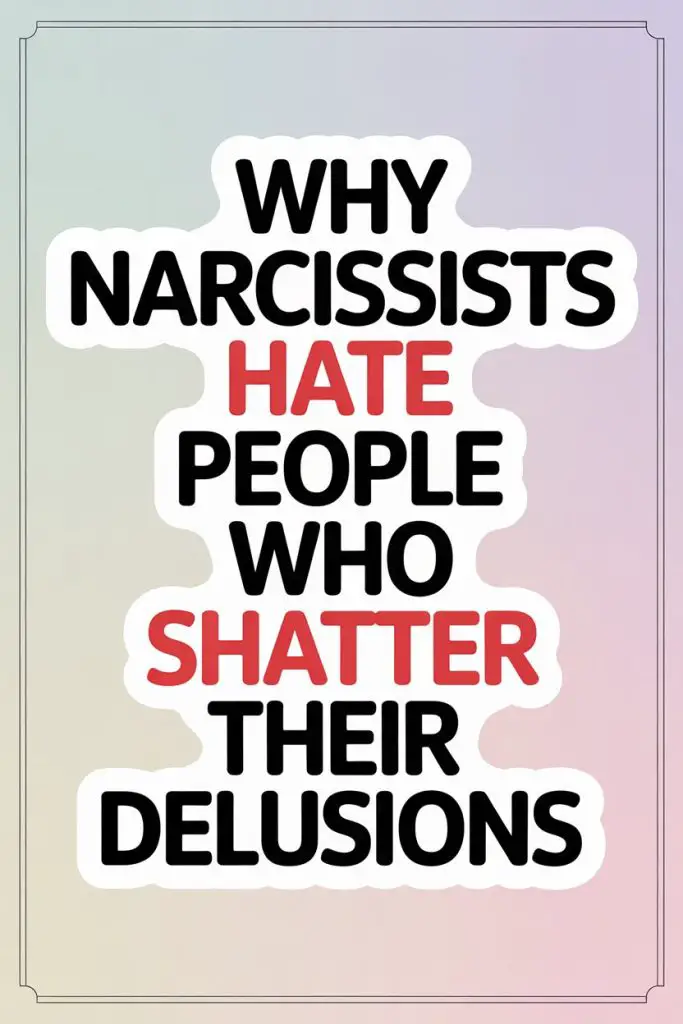Narcissists can be a handful; anyone who’s had the pleasure knows it’s equal parts dazzling and exasperating. But nothing gets under a narcissist’s skin quite like someone who refuses to buy into their fantasy version of reality.
That stubborn friend or partner who says, “Actually, that’s not what happened…”?
Prepare for fireworks. Let’s peel back the curtain on why narcissists treat truth-tellers like public enemy number one—and what you can do with that knowledge tonight.
The Delusion: Narcissists Aren’t Just Faking
Most folks imagine narcissists as vain peacocks, strutting around and flexing for attention. Sure, there’s plenty of selfie action, but beneath all that bravado sits a fragile, carefully constructed fantasy.
To a narcissist, reality is negotiable. Their self-image—brilliant, wronged, misunderstood genius—must never be questioned.
They stitch together a delusion where they’re the star, the victim, the hero, sometimes all before lunch. It’s not just lying; it’s existential airbrushing.
That’s where the trouble begins. Because for a narcissist, preserving this fantasy isn’t just a hobby. It’s their survival kit.
The Threat: Why Truth-Tellers Are So Dangerous
Ever tried to shake a snow globe and watched the flakes swirl in chaos? Correcting a narcissist’s story feels a lot like that.
When someone questions their version of events, the narcissist doesn’t see it as friendly feedback or a gentle nudge toward self-awareness.
They see you as a threat to the entire empire of “me” they’ve built.
People who poke holes in their narrative can cause what’s called “narcissistic injury”—a psychic paper cut that hurts more than it should.
Even small challenges (like remembering a different version of Tuesday night’s dinner) can feel like a full-on mutiny. Narcissists often react with anger, denial, or by painting you as the villain.
After all, if your reality stands, theirs might crumble. And that’s a risk they won’t take lying down.
The Defense Mechanisms: Gaslighting, Projection, and More
Why battle truth when you can bend it? Narcissists have a cunning toolkit for shutting down anyone who threatens their delusions.
Their go-to moves include:
- Gaslighting: Suddenly, you’re the confused one. “Are you sure that’s what happened? You always remember things wrong.”
- Projection: Accuse you of the very thing they’re doing: “You’re just trying to make me look bad!”
- Rage or Cold Shoulder: If all else fails, unleash the fury or turn up the emotional thermostat to Arctic.
These tactics aren’t accidental. The narcissist’s mind grabs any weapon to keep reality from barging in. If you’ve ever walked away from an argument feeling dizzy, you’re not alone.
Validation Addiction: Why Narcissists Need Agreement
Agreeing with a narcissist’s fairytale isn’t about stroking their ego. It’s about feeding their sense of stability.
The more you nod along, the safer they feel in their alternate universe. Disagreement, on the other hand, threatens to expose the magician behind the curtain.
And nobody wants to lose their magic show, especially when the audience is packed with admirers (or, at least, people who don’t call them out).
If you’ve ever wondered why narcissists seem to surround themselves with “yes-people” or quickly cut off anyone who challenges them, now you know. Agreement is their oxygen.
The Emotional Toll: What Happens When You Speak Up
Challenging a narcissist can feel like poking a bear—except the bear tells you you’re the one with anger issues.
You might get blamed for everything (“You’re always so negative!”), guilt-tripped, or even banished from the inner circle for your honesty.
At work, this can mean exclusion from projects; in families, it can look like silent treatment or smear campaigns at Christmas dinner.
Standing up can be lonely, especially when others are too weary (or wise) to challenge the story. But if you value your own sanity, sometimes it’s the only way.
Why Narcissists Can’t Stand Looking in the Mirror
Self-reflection sounds therapeutic, right? Not for a narcissist. Their entire self-worth is built on denial and deflection; self-awareness feels like standing under a cold shower—uninvited and deeply uncomfortable.
When confronted with the truth, narcissists face two impossible choices: admit error and patch their self-esteem, or double down on the fantasy and go to war.
Their fragile sense of self usually picks the latter. It’s less about arrogance and more about self-preservation.
If you’re waiting for a narcissist to say, “You’re right, I messed up,” you might be waiting a while. Bring snacks.
When Honesty Backfires: The Boomerang Effect
The idea that honesty is always the best policy? Noble, but not always safe with a narcissist. Sometimes, your attempt to introduce reality turns into a high-speed boomerang: suddenly, you’re the one being attacked.
Narcissists are experts in deflection. The more you challenge their story, the harder they work to paint you as unstable, jealous, or “out to get them.”
In relationships, this can mean relentless arguments or, worse, emotional withdrawal that leaves you questioning your own sanity.
Knowing when to speak up—and when to save your energy—can save you buckets of frustration.
Tips for Dealing With a Narcissist’s Delusions
No magic spell fixes narcissism overnight, but a few tricks can help you keep your cool.
- Pick your battles: Not every hill is worth dying on. Sometimes, a gentle redirection works better than full-frontal honesty.
- Beware the trap: Narcissists love baiting you into endless debates. If you feel the urge to prove them wrong, pause and ask: “Is this worth my peace?”
- Use “I” statements: Focus on your feelings and perspective rather than telling them outright they’re wrong. “I remember it differently” gets less backlash than “You’re lying again.”
- Set boundaries: If the emotional spin cycle leaves you dizzy, give yourself permission to step back. Protecting your mental health is not negotiable.
- Look for allies: If you’re in a family or workplace full of flying monkeys (narcissist enablers), confide in people who know and trust your version of reality.
Can a Narcissist Ever Accept the Truth?
The short answer: rarely. But growth isn’t impossible, especially for those rare unicorns willing to seek therapy. For most, though, admitting fault means risking a total ego collapse.
For your part, it helps to recalibrate expectations. Waiting for a narcissist to thank you for your honesty sets you up for heartbreak. Your job isn’t to fix them—it’s to protect yourself from the fallout.
When It’s Time to Walk Away
Staying in the truth-teller role with a narcissist is exhausting, and sometimes it’s safer to step back.
If you find yourself constantly defending your version of reality, losing sleep, or feeling isolated from others, it might be time to reassess the relationship.
Your well-being comes first. No amount of optimism or patience can resuscitate a relationship where your reality gets erased day after day.
Reclaiming Your Voice
Surviving a relationship with a narcissist is draining. But there’s a silver lining: folks who learn how to assert their truth in the face of delusion get a masterclass in self-advocacy.
Your voice is valid, whether the narcissist in your life acknowledges it or not. Keep grounding yourself in your own reality, and remember—sometimes, the greatest act of love is refusing to star in someone else’s fantasy.
Tonight, when the urge to challenge a narcissist bubbles up, take a breath and remind yourself: you’re not alone, and your truth is worth defending. Even if it ruffles a few feathers.


